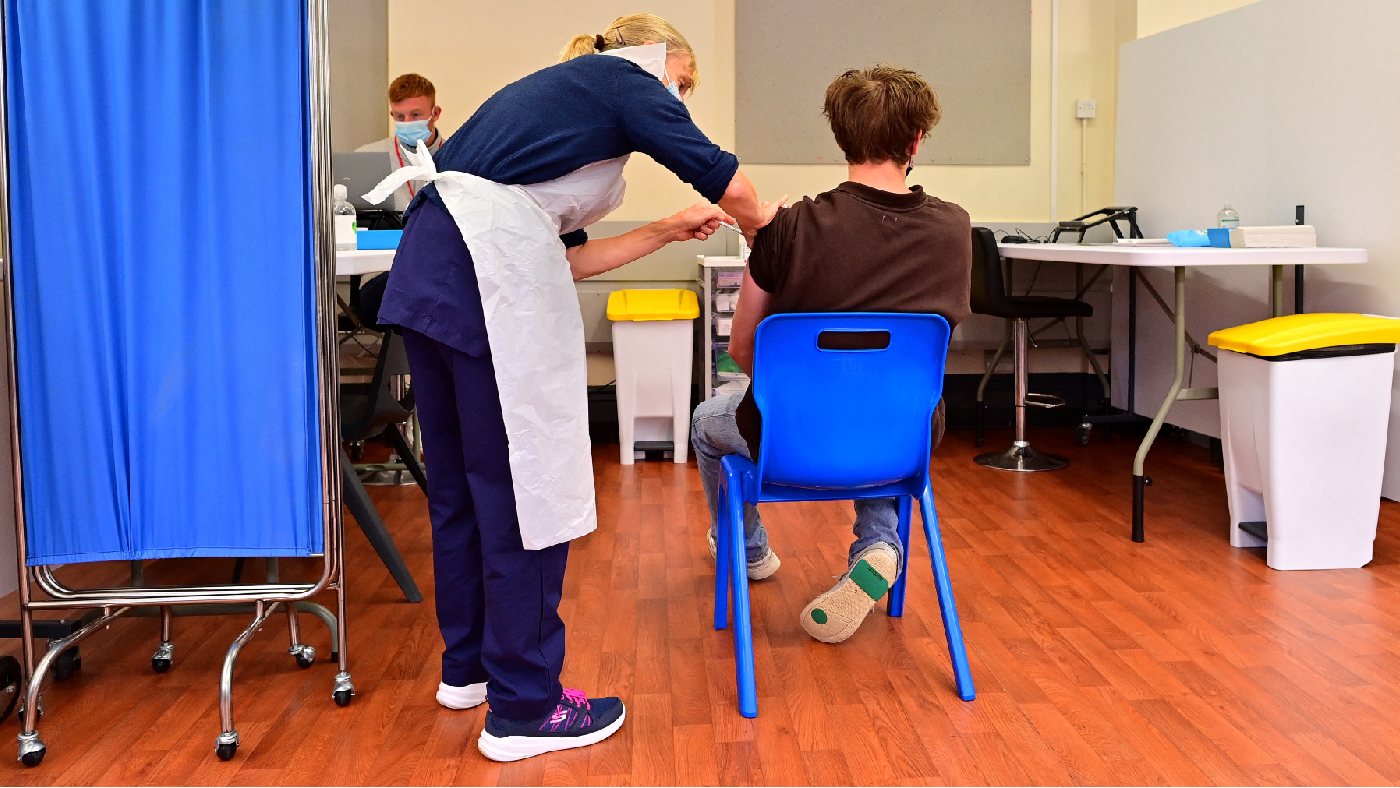Rule of six: the key changes to lockdown restrictions
England celebrates ‘Happy Monday’ as coronavirus restrictions relaxed

A free daily email with the biggest news stories of the day – and the best features from TheWeek.com
You are now subscribed
Your newsletter sign-up was successful
Friends and families across England are preparing to meet up as the “rule of six” finally returns after months of lockdown.
Small groups can meet outdoors from today, with the government unveiling the new slogan “Hands, Face, Space and Fresh Air” to emphasise the importance of ventilation in stopping the coronavirus from spreading.
Group outdoor sports and weddings attended by up to six people (including the couple) can also resume, as the legal stay-at-home order officially ends on what newspapers have dubbed “Happy Monday”.
The Week
Escape your echo chamber. Get the facts behind the news, plus analysis from multiple perspectives.

Sign up for The Week's Free Newsletters
From our morning news briefing to a weekly Good News Newsletter, get the best of The Week delivered directly to your inbox.
From our morning news briefing to a weekly Good News Newsletter, get the best of The Week delivered directly to your inbox.
Who can meet?
From today, people in England can meet in a group of six - including children of all ages - from up to six households, or in a group of any number from a maximum of two households, which can include existing support bubbles.
Where can they go?
For now, groups from different households can only meet outside. These gatherings can take place in parks, beaches, allotments, playgrounds, heritage sites and other public spaces, and also in private gardens.
A free daily email with the biggest news stories of the day – and the best features from TheWeek.com
The government accepts that people may need to go inside to use the bathroom, or go through a property to get outdoors. In these situations, the advice on gov.uk is for people to wash their hands thoroughly, wear a face covering, maintain social distancing and go back outside as quickly as possible.
Families and friends have also been told to “resist the temptation to hug after the first big relaxation of lockdown restrictions”, says The Times, which points out that the easing of rules “coincides with a mini-heatwave” in the UK.
Are there still fines?
Yes, anyone breaking the rules can be given a Fixed Penalty Notice of £200 for the first offence, doubling up for further offences to a maximum of £6,400. Holding an illegal gathering of more than 30 people can be punished with a fine of up to £10,000.
When can people meet indoors?
The rule of six or two households will not be extended to indoor settings until at least 17 May. From that date, the government also hopes to ease legal restrictions on the number of people meeting outside to around 30.
Why six?
MPs voted last October to extend emergency Covid restrictions, but some rebel Tories argued that the rule of six was “not based on scientific evidence”, as the BBC reported at the time. Hitting back at the critics in the Commons, Health Minister Helen Whately said the number was chosen to help make the guidance “simple and absolutely clear for everybody”.
The rule of six enabled “a level of socialising for the sake of people’s quality of life, while taking steps to control the virus”, Whately told MPs.
What about the rest of the UK?
- In Wales: rules were eased on Saturday to allow six people from two households to meet outdoors. Children under 11 are not included in the count.
- In Scotland: the current limit of four people from two households meeting outdoors is expected to be extended from 26 April to six people from three households. Under-18s will be able to meet in a group of six from six households from this date.
- In Northern Ireland: six people, including children, from two households can meet in a private garden from Thursday. From 12 April, this is limit is due to be extended to ten people, including children, from two households.
-
 The problem with diagnosing profound autism
The problem with diagnosing profound autismThe Explainer Experts are reconsidering the idea of autism as a spectrum, which could impact diagnoses and policy making for the condition
-
 What to know before filing your own taxes for the first time
What to know before filing your own taxes for the first timethe explainer Tackle this financial milestone with confidence
-
 The biggest box office flops of the 21st century
The biggest box office flops of the 21st centuryin depth Unnecessary remakes and turgid, expensive CGI-fests highlight this list of these most notorious box-office losers
-
 The new Stratus Covid strain – and why it’s on the rise
The new Stratus Covid strain – and why it’s on the riseThe Explainer ‘No evidence’ new variant is more dangerous or that vaccines won’t work against it, say UK health experts
-
 Covid-19: what to know about UK's new Juno and Pirola variants
Covid-19: what to know about UK's new Juno and Pirola variantsin depth Rapidly spreading new JN.1 strain is 'yet another reminder that the pandemic is far from over'
-
 Vallance diaries: Boris Johnson 'bamboozled' by Covid science
Vallance diaries: Boris Johnson 'bamboozled' by Covid scienceSpeed Read Then PM struggled to get his head around key terms and stats, chief scientific advisor claims
-
 Good health news: seven surprising medical discoveries made in 2023
Good health news: seven surprising medical discoveries made in 2023In Depth A fingerprint test for cancer, a menopause patch and the shocking impacts of body odour are just a few of the developments made this year
-
 How serious a threat is new Omicron Covid variant XBB.1.5?
How serious a threat is new Omicron Covid variant XBB.1.5?feature The so-called Kraken strain can bind more tightly to ‘the doors the virus uses to enter our cells’
-
 Will new ‘bivalent booster’ head off a winter Covid wave?
Will new ‘bivalent booster’ head off a winter Covid wave?Today's Big Question The jab combines the original form of the Covid vaccine with a version tailored for Omicron
-
 Non-Covid excess deaths: why are they rising?
Non-Covid excess deaths: why are they rising?In the Spotlight Experts call for probe as mortality rates in England and Wales climb despite drop in coronavirus deaths
-
 Can North Korea control a major Covid outbreak?
Can North Korea control a major Covid outbreak?feature Notoriously secretive state ‘on verge of catastrophe’